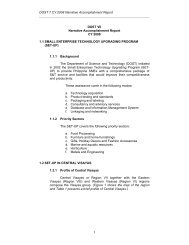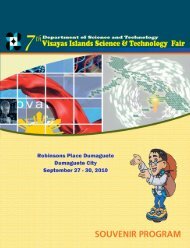DOST 7 SET-UP Product Catalogue - DOST 7! - Department of ...
DOST 7 SET-UP Product Catalogue - DOST 7! - Department of ...
DOST 7 SET-UP Product Catalogue - DOST 7! - Department of ...
You also want an ePaper? Increase the reach of your titles
YUMPU automatically turns print PDFs into web optimized ePapers that Google loves.
Buglas Bamboo Institute<br />
Trendy, Versatile And With A Tensile<br />
Strength Higher Than Steel<br />
Traditionally dubbed as the “poor man’s” lumber, bamboo has been underrated as a material for good<br />
furniture. It is not only indigenous but also renewable, an earth-friendly resource with a wide range <strong>of</strong><br />
applications. And, do you know that the tensile strength <strong>of</strong> bamboo is higher than that <strong>of</strong> steel? Are you<br />
also aware that the Philippine bamboo is the best bamboo in the world?<br />
The widespread production and utilization <strong>of</strong> bamboo<br />
and its use as a resource that can provide business<br />
and livelihood to so many people while enhancing the<br />
environment are the concerns <strong>of</strong> the Buglas Bamboo<br />
Institute (BBI), a non-stock, non-pr<strong>of</strong>it organization<br />
promoting rural development.<br />
Buglas is the old Spanish name <strong>of</strong> Negros. In Ilonggo,<br />
they refer to buglas when they mean tall grasses, and<br />
as the story goes, in between these grasses were<br />
found the small Negritos.<br />
BBI started as an NGO established by Frans Kleine<br />
Koerkamp, a Dutch who has made the Philippines,<br />
his home. The idea <strong>of</strong> adding value to bamboo led<br />
the group to conduct researches in 1995. It was in<br />
1999 that the production <strong>of</strong> bamboo started. Over<br />
the years, BBI has organized 10 communities, six<br />
<strong>of</strong> which are regular suppliers <strong>of</strong> bamboo. BBI now<br />
operates a furniture factory in the southern town <strong>of</strong><br />
Dauin, Negros Oriental.<br />
With limited working capital, upgrading the bamboo<br />
drying and finishing technologies <strong>of</strong> BBI was a major<br />
concern that led to the partnership between BBI and<br />
<strong>DOST</strong> through the latter’s program, <strong>SET</strong>-<strong>UP</strong>. The<br />
problem with bamboo is that if there is moisture left,<br />
59<br />
DEPARTMENT OF SCIENCE AND TECHNOLOGY VII<br />
<strong>Product</strong> <strong>Catalogue</strong> 2011<br />
fungus grows causing staining, which is not<br />
aesthetically pleasing, thus, lowering the market<br />
value <strong>of</strong> the product. Without a new dryer, drying will<br />
also be confined to the drying <strong>of</strong> shorter and smaller<br />
poles. The lack <strong>of</strong> a proper finishing area forces the<br />
workers to rely on the open space spray finishing<br />
method, which is subject to weather conditions. Or,<br />
the spraying is done near the other workers posing<br />
health hazards.<br />
Through <strong>SET</strong>-<strong>UP</strong>, a furnace-type bamboo dryer<br />
designed by FPRDI, was acquired. This is in contrast<br />
to the existing mechanical dryer which has a smaller<br />
capacity and is less effective in attaining the desired<br />
moisture content. This upgraded equipment in fact<br />
more than doubled BBI’s drying capacity and greatly<br />
improved raw material quality by lessening the<br />
incidence <strong>of</strong> fungus growth. Adoption <strong>of</strong> the spray<br />
booth technology improved the working environment,<br />
thus, safeguarding the worker’s health.<br />
The market for bamboo is huge. However, competition<br />
abroad is stiff with China as the most formidable<br />
competitor because <strong>of</strong> its low priced engineered<br />
bamboo products. The current global financial<br />
crisis has also discouraged overseas demand for<br />
Philippine-made furniture. Many local buyers also<br />
prefer other cheaper materials and high production<br />
costs have increased its price.<br />
Despite these developments, the plan to link BBI<br />
with possible markets in Germany and Europe is<br />
in the works. Jobert Koerkamp, BBI’s Business<br />
Manager, mentioned this as part <strong>of</strong> their plan. He<br />
added that the local market is being developed.<br />
Tie-ups with academic institutions for their design<br />
students to make bamboo designs are also being<br />
explored.<br />
“Bamboo is just one. We have many resources in<br />
the Philippines which are not sufficiently appreciated.<br />
If that would change, the attitude <strong>of</strong> people towards<br />
the environment will also change.” Frans emphasized<br />
the need to maintain the resources and not to deplete<br />
it. With this conviction, the “poor man’s” lumber is<br />
here to stay for all generations to realize its versatility.<br />
Buglas Bamboo Institute (BBI)<br />
Maayong Tubig, Dauin Negros Oriental<br />
Mr. Jobert Kleine Koerkamp<br />
Business Manager<br />
Mobile: 0927 508 6655<br />
Email: buglasbamboo_se@yahoo.com




